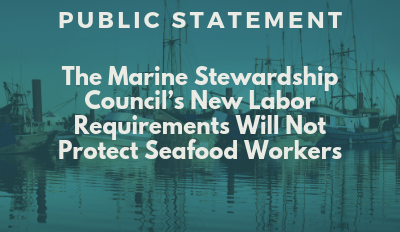
A group of leading labor, human rights, and environmental organizations released a statement today expressing concern over the labor requirements in the Marine Stewardship Council’s revised Chain of Custody certification for on-shore seafood operations. The new requirements, released earlier this year, will not be effective in identifying, preventing and protecting seafood workers from labor rights violations, the statement says. Nor will they provide buyers and retailers with the assurance that child labor and forced labor are not present in their supply chains.
MSC proposes classifying countries into low and high risk, with labor due diligence required only for seafood operations in the high-risk ones. “The way that MSC defines the criteria for risk will allow seafood operations that may have serious labor abuses – such as processing and shrimp-peeling facilities – to be certified without any labor due diligence simply because they are in countries classified as low risk”, said Judy Gearhart, Executive Director of the International Labor Rights Forum.
On-shore seafood operations located in countries considered to be high risk according to MSC’s criteria are required to undergo one of three proposed labor audit programs in order to obtain certification: SA8000, SEDEX or Amfori. These have proven to be ineffective in detecting and remediating serious labor rights violations in other supply chain industries, the statement says.
The 13 human rights and environmental organizations are recommending that all seafood operations, regardless of which country they are in, be required to conduct strong labor due diligence. They also recommend the development of a complaint mechanism that provides workers and labor rights stakeholders a channel to raise labor grievances. As MSC and other sustainability programs seek to address the rights and well-being of seafood workers, it is critical that they undertake genuine and thorough consultation with trade unions, worker-led organizations and labor experts.

